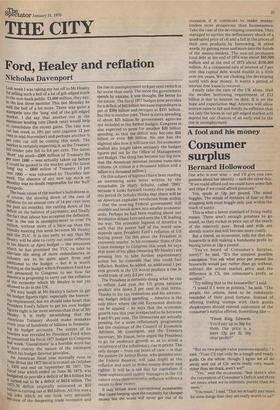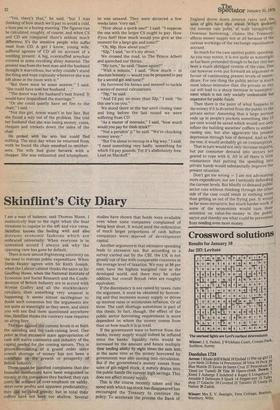A fool and his money.
Consumer surplus
Bernard Hollowood
One who is ever wise — and I'll give you two guesses about her identity — said the other day, "If we could afford cod we could have some fish and chips if we could afford potatoes."
Yes, spuds at 12p per pound. The mind boggles. The minds of mothers of four or five strapping kids must boggle only just within the reach of sanity.
This is what a lower standard of living really means. There aren't enough potatoes to go round, so they rocket in price out of the reach of the relatively poor. Bread and milk are already scarce and will become more costly.
But a friend, an economist, tells me that the housewife is still making a handsome profit by buying,taties at 12p a pound...
"You've heard of Consumer's Surplus, surely?" he said. "It's the simplest possible conception. You ask what price per pound the housewife would pay rather than go without, subtract the actual market price and the difference is CS, the consumer's profit or surplus."
"Try telling that to the housewife!" I said.
"I would if I were in politics," he said. "The people, the unions, need to be constantly reminded of their good fortune. Instead of offering trading stamps with their goods shopkeepers should remind customers of the consumer's surplus offered. Something like — "Finest King Edwards. You'd pay up to 50p for them. Our price is a mere 12p per lb. 38p clear profit!!"
"But no two people value potatoes equally," I said. "Your CS can only be a rough and ready guide. On the whole, though, I agree we all do pretty well out of CS: we're really very much richer than we think, aren't we?"
"Yes," said the economist, "but there's also the conception of Consumer's Deficit and there are times when we're infinitely poorer than we seem."
"You mean," I said, "That we actually pay more for some things than they are really worth to us?" "Yes, there's that," he said, "but I was thinking of how much we'd pay to avoid a cold, a faux pas or a boring meeting. The figures can be calculated, roughly, of course, and when CS and CD are compared there's seldom much difference. It's the sensitive people who suffer most from CD. A girl I know, young wife, suffered agonies of CD all on account of a wedding present. A big, overstuffed armchair covered in some revolting shiny material. The present was from the best man and the husband thought it marvellous, but wifey couldn't stand the thing and wept copiously whenever she was left alone in the room with it."
"But there must be some answer," I said. "She could have told her husband ..."
The donor was the husband's best friend, It would have jeopardised the marriage."
"Or she could quietly have set fire to the chair," I said.
"Not this girl. Arson wasn't in her line. But she found a way out of the problem. She told her husband that she was losing money, coins, cheques and trinkets down, the sides of the chair.
He probed with his arm but could find nothing. The next day when he returned from work he found the chair smashed to smithereens. The wife had gone berserk with a chopper. She was exhausted and triumphant: he was amazed. They were divorced a few weeks later. Very sad."
"How about a quick one?" I said. "I suppose the one with the larger CS ought to pay. How d'you feel? How much would you give at the moment for a large gin and tonic?"
"Oh, 80p. How about you?"
"82p," I said, "so it's my shout."
We crossed the road, to The Prince Albert and quenched our thirsts.
"My turn," he said. "Same again?"
"Wait a minute," I said. "How much — in absolute honesty — would you be prepared to pay for a second gin and tonic?"
He furrowed his brows and seemed to tackle a series of mental calculations.
"70p," he said.
"And I'd pay no more than 52p," I said. "So this one's on you."
We stood there at the bar until closing time and long before the last round we were suffering from CD.
"As a matter of interesht," I said, "how much would you pay for thish drink?"
"Not a perishin' p," he said. "We're chucking money away."
"But I'm about to recoup in a big way," I said.
"I need something very badly, something for which I'd pay pounds. Yet it's absholutely free. Lead on Macduff."



























 Previous page
Previous page